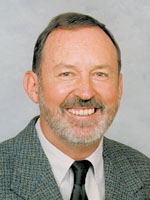Kenneth B. O'Connor
Ken O’Connor is an independent classroom assessment consultant with a special interest in grading and reporting. An internationally recognized speaker who has presented in 47 states in the United States, 9 provinces and one territory in Canada, and 24 other countries, he has also consulted for schools, districts, and state and provincial departments of education. He had 23 years of classroom experience from grade 7 to grade 12, and 10 years of experience as a curriculum coordinator for a large school district. Ken was born in Melbourne, Australia, but has lived most of his life in the east end of Toronto, Canada.
His major extra-curricular interest is field hockey, as a player, umpire and coach. As a coach, three of his players went on to represent Canada in the Olympics. He also umpired at the 1984 Olympic Games and the 1990 World Cup.
Workshops
- How to Grade for Learning using Eight Guidelines for Grading (Keynote – 75 minutes; Interactive session – 2-3 hours to 2 days): Grades can provide important information for students, parents, teachers, and others but to be useful grades must be meaningful, accurate, consistent, and supportive of learning. Sometimes grades are "broken" and do not meet these standards. The session will begin with introductory ideas and activities to activate thinking about grading using materials from the fourth edition of "How to Grade for Learning." The main section of the workshop will be the presentation and discussion of eight guidelines for grading, guidelines that will make grades accurate, meaningful, consistent and supportive of learning. Each guideline will be introduced and then there will be opportunity for questions and discussion about each guideline
- How to Grade for Learning using Fixes for Broken Grades (Keynote – 75 minutes; Interactive session – 2-3 hours to 2 days): Grades can provide important information for students, parents, teachers, and others but to be useful grades must be meaningful, accurate, consistent, and supportive of learning. Sometimes grades are "broken" and do not meet these standards. The session will begin with introductory ideas and activities to activate thinking about grading. The main section of the workshop will be the presentation and discussion of fifteen fixes for grading, fixes that will make grades accurate, meaningful, consistent and supportive of learning. Each fix will be introduced and then there will be opportunity for questions and discussion about each fix.
- The Way Ahead in Communicating Student Achievement (Keynote – 75 minutes; Interactive session – 2-3 hours): After many years of implementation of standards-based curriculum, instruction and assessment, the time has come to say that traditional grading practices are no longer acceptable, and to demand changes, especially in secondary schools. In this session the six “Musts” to make grading effective will be presented as demands for school leaders to implement so their students become independent, self-directed learners and get the full benefits of high quality teaching and assessment.
- Effective Reporting of Student Achievement (Interactive session – 2-3 hours):
“Nothing really changes until the grade book and the report card changes.”
Curriculum, instruction, and assessment have increasingly become standards-based but parallel changes in grading and reporting have been slow, especially in middle and high schools. This session will focus on guidelines for non-traditional reporting. Issues that will be addressed include purpose, content standards, performance standards, learning skills/work habits, and student and parent involvement. Examples of non-traditional reporting will be shared and participants will have opportunities to discuss the principles and practicality of moving away from traditional reporting.
- Reviewing and Revising Your Grading and Reporting Policies and Practices (Keynote – 75 minutes; Interactive session – 2-3 hours to 1 day):
How well are you communicating about your students as learners? When did you last review and revise your policies and practices?
This session will provide opportunities to review the following:
- the purpose(s) of grading and reporting;
- the base for grading and reporting (subjects and/or learning goals);
- performance standards (points/%/levels);
- honoring the learning process (formative/summative and more recent);
- ingredients in grades and how you report behaviors;
- the determination of grades (calculation or professional judgment);
- how you handle hot button issues (late and missing work, academic dishonesty).
- Transformations – Personal, Professional and Pressing (Keynote 75 minutes): In this session the presenter will share the most significant personal and professional transformations that have happened in his life and invite participants to consider their own transformations. Then the fourteen transformations necessary to make communication of student learning more effective will be presented and participants will be invited to consider where they are on each of the transformations.
